List of heads of government of Russia
Approximately 38 people have been head of the Russian government since its establishment in 1905.
- Top left: In 1905, Sergei Witte became the first prime minister of the Russian Empire.
- Top right: In 1917, Vladimir Lenin became the first prime minister of the Soviet Russia and later the Soviet Union (1922).
- Bottom left: In 1992, Viktor Chernomyrdin became the first prime minister of post-soviet Russia.
- Bottom right: Mikhail Mishustin is the current prime minister.
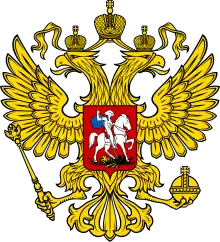 |
|---|
|
|
The Council of Ministers of the Russian Empire, created in November 1905, was preceded by a number of cabinet-like institutions. Oldest of them was the Supreme Privy Council, created in 1726 by the empress Catherine I. Considering weakness of her and her successor's powers, the Council acted as government of the Russian Empire until 1731. Its successor departments such as the Cabinet of Her Imperial Majesty (1731–41), the Conference at the Highest Court (1756–62), the Imperial Council (1762) and finally the Council at the Highest Court (1768–1801) remained mostly advisory bodies to the monarch.
The ministerial reform of 1802 introduced the Committee of Ministers, which competence was limited to interagency issues. The Committee was not responsible for the activities of individual ministries and for the coherence of their policies. Beginning with Count Aleksandr Romanovich Vorontsov, the eldest of the officers was de facto chairman of the committee. Eight years after the inauguration of the manifest, the first de jure office holder was Count Nikolay Rumyantsev.[1] According to the tradition established over time, the chairmanship of the Committee was the last honorary position, to which elderly respected officials were appointed.
The Council of Ministers was unofficially formed in October 1857, as a result of Emperor Alexander II's reforms; its first session began on 19 (31) December 1857. Before the actual formation of that body on 12 (24) November 1861, the Emperor himself was in charge. The Council of Ministers consisted of chairmen of the State Council and the Committee of Ministers, as well as high-ranking officers appointed by the Emperor. The first session ended on 11 (23) December 1882, after the number of files to the Council greatly decreased.[2][3]
The imperial Council of Ministers was re-established in late 1905, as a part of the large-scale government reform caused by the First Russian Revolution. All ministries and departments became parts of a single national administration. The Committee of Ministers functioned simultaneously with the second session of the Council of Ministers for six more months; Count Sergei Witte participated on both entities until the abolition of the committee on 23 April (5 May) 1906.
By the order of Emperor Nicholas II, the second session of the Council of Ministers began on 19 October (1 November) 1905, following the formation of the State Duma. Shortly after the February Revolution and the inception of the Russian Provisional Government on 2 (15) March 1917, Georgy Lvov from the Constitutional Democratic Party became Minister-Chairman, who was succeeded by Alexander Kerensky in July.
In November 1917 the Provisional Government was overthrown by the Bolshevik faction of Russian social democrats led by Vladimir Lenin. The Council of People's Commissars of the Russian Soviet Republic became the new governmental body, which was chaired from 1917–24 by Lenin. That body was renamed Council of Ministers following a decree of the Supreme Council on 23 March 1946. The same was made in other republics of the Soviet Union.
After the fall of the Soviet Union, Boris Yeltsin, as the President of the Russian Federation, was appointed as the extraordinary head of government of the Russian Federation. The latter body took the name "Council of Ministers — Government of Russia", the chairman of which became Viktor Chernomyrdin, replacing acting chairman Yegor Gaidar. According to the new constitution ratified on 25 December 1993, the "Government" (Russian: Правительство, romanized: Pravitelstvo) is the official name of the Russian cabinet. Since then, the head of that office takes the formal title "Chairmen of the Government" or colloquially "Prime Minister."
Current Prime Minister Mikhail Mishustin took the office on 16 January 2020.
The youngest head of government by his accession to office was Sergey Kiriyenko (1998), at age 35, and the oldest Ivan Goremykin (1914), at age 74.
Russian Empire (1721–1917)
Early collegial institutions without a single leader
Since the 18th century, a modern system of public administration was going to be created in Russia, including the formation of bodies such as the Supreme Privy Council and the Committee of Ministers whose powers are similar to the powers of the modern Russian Government. In the period from 1726 to 1905 there was no official title for the leader of the government. The chief ministers (principal ministres) of certain Emperor of All Russia nonetheless led the government de facto, but de jure the head of government was a monarch.[4]
| Portrait | Name (birth–death) |
Term of office | Monarch | ||||
|---|---|---|---|---|---|---|---|
| Members of the Supreme Privy Council of the Russian Empire (1726–1730) | |||||||
.jpg.webp) |
Count and Prince Alexander Danilovich Menshikov (1673–1729) |
8 February 1726 |
8 September 1727 |
Catherine I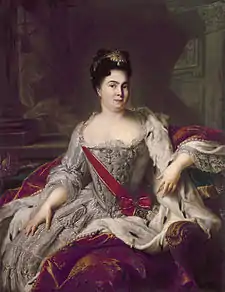 (1725–1727) Peter II .jpg.webp) (1727–1730) Anna .jpg.webp) (1730–1740) | |||
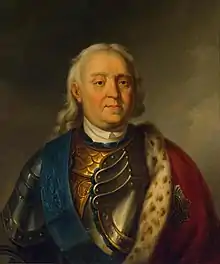 |
Count Fyodor Matveyevich Apraksin (1661–1728) |
8 February 1726 |
10 November 1728 | ||||
 |
Count Gavriil Ivanovich Golovkin (1660–1734) |
8 February 1726 |
6 May 1727 | ||||
_%D0%9E%D1%81%D1%82%D0%B5%D1%80%D0%BC%D0%B0%D0%BD.jpg.webp) |
Count Andrey Ivanovich Osterman (1686–1747) |
8 February 1726 |
6 May 1727 | ||||
.jpg.webp) |
Prince Dmitry Mikhaylovich Golitsyn (1665–1737) |
8 February 1726 |
6 May 1727 | ||||
 |
Count Pyotr Andreyevich Tolstoy (1645–1729) |
8 February 1726 |
6 May 1727 | ||||
.jpg.webp) |
Count Karl-Fridrikh Golshteyn-Gottorpsky (1700–1739) |
8 February 1726 (or March 1726)[5] |
25 July 1727 | ||||
 |
Prince Alexey Grigoryevich Dolgorukov (?–1734) |
3 February 1728 |
4 March 1730 | ||||
.jpg.webp) |
Prince Vasily Lukich Dolgorukov (1670–1739) |
6 April 1729 |
4 March 1730 | ||||
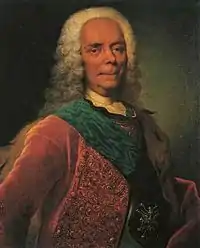 |
Prince Vasily Vladimirovich Dolgorukov (1667–1746) |
19 January 1730 |
4 March 1730 | ||||
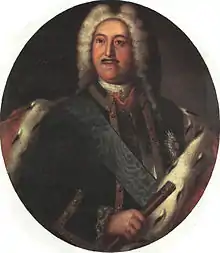 |
Prince Mikhail Mikhailovich Golitsyn (1675–1730) |
19 January 1730 |
4 March 1730 | ||||
| Cabinet ministers of the Russian Empire (1731–1741) | |||||||
 |
Count Gavriil Ivanovich Golovkin (1660–1734) |
10 November 1731 |
20 January 1734 |
Anna.jpg.webp) (1730–1740) | |||
_%D0%9E%D1%81%D1%82%D0%B5%D1%80%D0%BC%D0%B0%D0%BD.jpg.webp) |
Count Andrey Ivanovich Osterman (1686–1747) |
20 January 1734 |
10 November 1740 | ||||
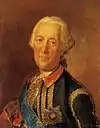 |
Count Khristofor Antonovich Minikh (1683–1767) |
10 November 1740 |
3 March 1741 |
Ivan VI.jpg.webp) (1740–1741) | |||
_%D0%9E%D1%81%D1%82%D0%B5%D1%80%D0%BC%D0%B0%D0%BD.jpg.webp) |
Count Andrey Ivanovich Osterman (1686–1747) (2nd time) |
3 March 1741 |
25 November 1741 | ||||
| Conferency ministers at the Highest Court of the Russian Empire (1756–1762) | |||||||
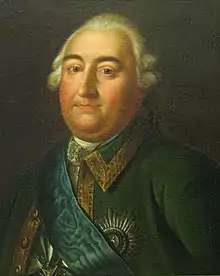 |
Stepan Fyodorovich Apraksin (1702–1758) |
14 March 1756 |
1 October 1757 |
Elizabeth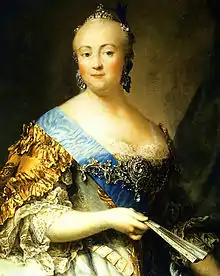 (1741–1762) Peter III  (1762) | |||
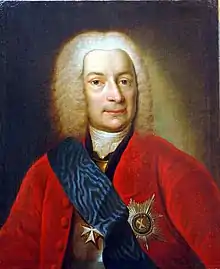 |
Count Mikhail Petrovich Bestuzhev-Ryumin (1688–1760) |
14 March 1756 |
2 October 1757 | ||||
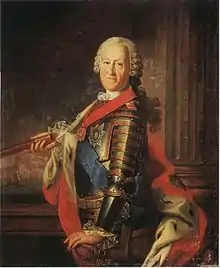 |
Prince Mikhail Mikhaylovich Golitsyn (1684–1764) |
14 March 1756 |
17 December 1757 | ||||
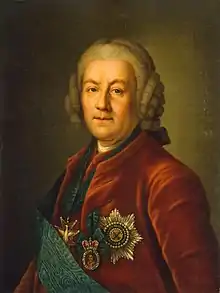 |
Count Alexey Petrovich Bestuzhev-Ryumin (1693–1768) |
14 March 1756 |
14 February 1758 | ||||
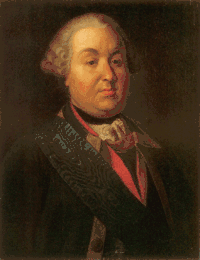 |
Count Alexander Borisovich Buturlin (1694–1767) |
14 March 1756 |
17 October 1760 | ||||
.jpg.webp) |
Count Peter Ivanovich Shuvalov (1711–1762) |
14 March 1756 |
4 January 1762 | ||||
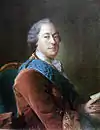 |
Count Mikhail Illarionovich Vorontsov (1714–1767) |
14 March 1756 |
20 January 1762 | ||||
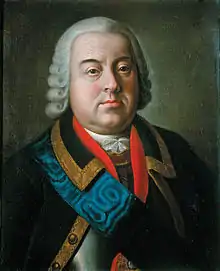 |
Prince Nikita Yuryevich Trubetskoy (1699–1767) |
14 March 1756 |
20 January 1762 | ||||
 |
Count Alexander Ivanovich Shuvalov (1710–1771) |
14 March 1756 |
20 January 1762 | ||||
 |
Grand Duke Peter Fyodorovich Romanov (subsequently Emperor Peter III) (1728–1762) |
14 March 1756 |
28 January 1762 | ||||
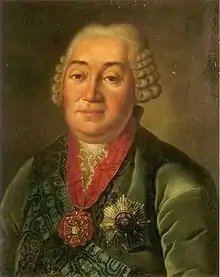 |
Prince Yakov Petrovich Shakhovskoy (1705–1777) |
16 September 1760 |
25 December 1761 | ||||
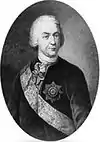 |
Ivan Ivanovich Neplyuev (1693–1773) |
16 September 1760 |
20 January 1762 | ||||
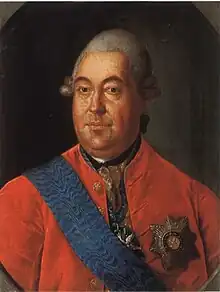 |
Count Roman Illarionovich Vorontsov (1707–1783) |
28 December 1761 |
20 January 1762 | ||||
| Members of the Imperial Council of the Russian Empire (1762) | |||||||
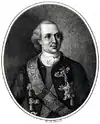 |
Prince Georg-Ludwig Golshteyn-Gottorpsky (1719–1763) |
28 January 1762 |
28 June 1762 |
Peter III (1762) | |||
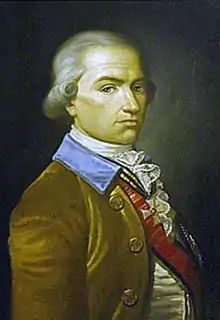 |
Count Pyotr August Friedrich Golshteyn-Beksky (1696–1775) |
28 January 1762 |
28 June 1762 | ||||
 |
Count Khristofor Antonovich Minikh (1683–1767) |
28 January 1762 |
28 June 1762 | ||||
 |
Prince Nikita Yuryevich Trubetskoy (1699–1767) |
28 January 1762 |
28 June 1762 | ||||
 |
Count Mikhail Illarionovich Vorontsov (1714–1767) |
28 January 1762 |
28 June 1762 | ||||
 |
Aleksandr Nikitich Vilbua (1713–1788) |
28 January 1762 |
28 June 1762 | ||||
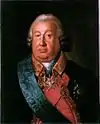 |
Prince Mikhail Nikitich Volkonsky (1713–1788) |
28 January 1762 |
28 June 1762 | ||||
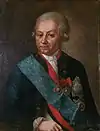 |
Aleksey Petrovich Melgunov (1722–1788) |
28 January 1762 |
28 June 1762 | ||||
| Heads of Council Affairs at the Highest Court (Highest Council) of the Russian Empire (1768–1801) | |||||||
 |
Stepan Fyodorovich Strekalov (1728–1805) |
17 November 1768 |
1776 | Catherine II.jpg.webp) (1762–1796) | |||
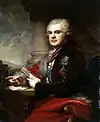 |
Count Alexander Nikolayevich Samoylov (1744–1814) |
1776 | 1787 | ||||
 |
Ivan Andreyevich Weydemeyer (1752–1820) |
1787 | 18 November 1796 | ||||
.jpg.webp) |
Gavriil Romanovich Derzhavin (1743–1816) |
18 November 1796 |
22 November 1796 |
Paul I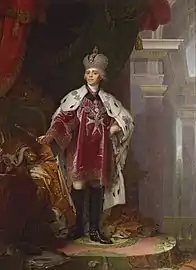 (1796–1801) | |||
 |
Ivan Andreyevich Weydemeyer (1752–1820) (2nd time) |
18 November 1796 |
26 March 1801 | ||||
Committee of Ministers (1802–1905)
The Committee of Ministers was established on 20 September 1802 in the course of Alexander I's ministerial reform. All the ministers were independent from each other and were responsible for the activities of their departments individually. The Committee was not responsible either for the activities of individual ministries, or for the coherence of their policies. During the first years of the existence of the Committee, its meetings were chaired by the Emperor, and in his absence - by the ministers alternately, starting with the senior in rank, each for 4 sessions. In 1810, the chairmanship was given to the chancellor and chairman of the State Council Count N.P. Rumyantsev.
| Portrait | Name (birth–death) |
Term of office | Monarch | ||||
|---|---|---|---|---|---|---|---|
| Chairmen of the Committee of Ministers of the Russian Empire (1802–1905) | |||||||
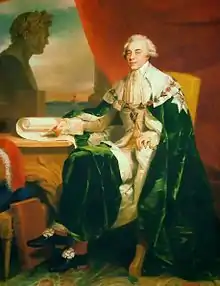 |
Count Nikolay Petrovich Rumyantsev (1754–1826) |
1810 | 1812 | Alexander I_crop.jpg.webp) (1801–1825) | |||
 |
Count and Prince Nikolay Ivanovich Saltykov (1736–1816) |
29 March 1812[6] |
9 September 1812 (disputed)[note 1] 16 May 1816 | ||||
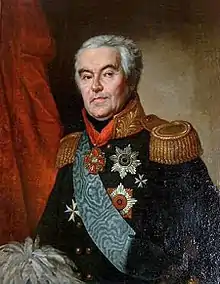 |
Count Sergey Kuzmich Vyazmitinov (disputed)[note 2] (1744–1819) |
9 September 1812 |
15 October 1816 | ||||
.jpg.webp) |
Prince Pyotr Vasilyevich Lopukhin (1753–1827) |
25 May 1816[7] |
6 April 1827 | ||||
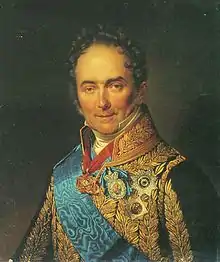 |
Prince Viktor Pavlovich Kochubey (1768–1834) |
29 April 1827[8] |
3 June 1834 |
Nicholas I.jpg.webp) (1825–1855) | |||
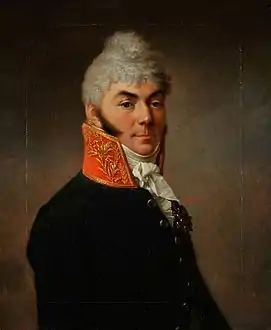 |
Count Nikolay Nikolayevich Novosiltsev (1761–1838) |
11 July 1834[9] |
8 April 1838 | ||||
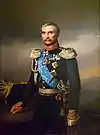 |
Prince Illarion Vasilyevich Vasilchikov (1776–1847) |
9 April 1838[10] |
21 February 1847 | ||||
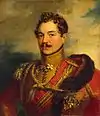 |
Count Vasily Vasilyevich Levashov (1783–1848) |
31 December 1847[11] |
23 September 1848 | ||||
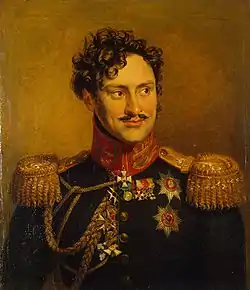 |
Prince Alexander Ivanovich Chernyshyov (1785–1857) |
1 December 1848[12] |
5 April 1856[12] | ||||
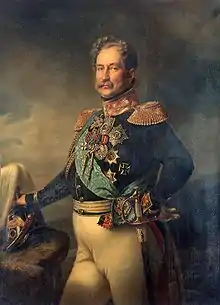 |
Prince Alexey Fyodorovich Orlov (1787–1862) |
May 1857[13] |
January 1861[14] |
Alexander II.jpg.webp) (1855–1881) | |||
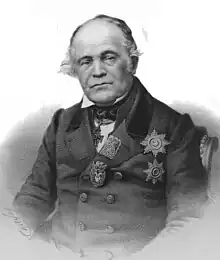 |
Count Dmitry Nikolayevich Bludov (1785–1864) |
12 November 1861 |
19 February 1864 | ||||
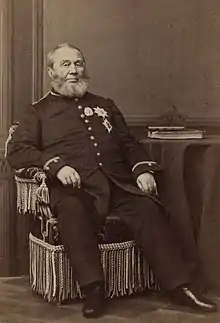 |
Prince Pavel Pavlovich Gagarin (1789–1872) |
24 February 1864[15] |
21 February 1872 | ||||
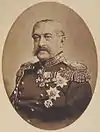 |
Count Pavel Nikolayevich Ignatyev (1797–1879) |
21 February 1872[16] |
20 December 1879[16] | ||||
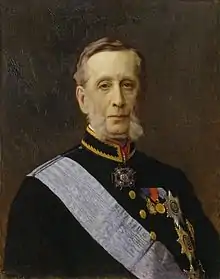 |
Count Pyotr Aleksandrovich Valuyev (1815–1890) |
25 December 1879[17] |
4 October 1881[17] | ||||
 |
Count Mikhail Khristoforovich Reytern (1820–1890) |
4 October 1881[18] |
30 December 1886[18] |
Alexander III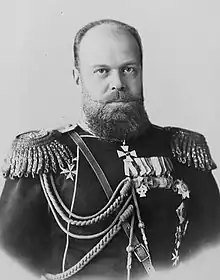 (1881–1894) | |||
 |
Nikolay Khristianovich Bunge (1823–1895) |
1 January 1887[19] |
3 June 1895[19] | ||||
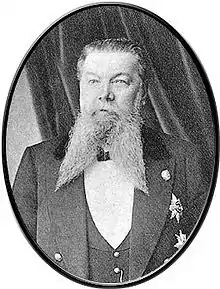 |
Ivan Nikolayevich Durnovo (1834–1903) |
15 October 1895[20] |
29 May 1903 |
Nicholas II-2.jpg.webp) (1894–1917) | |||
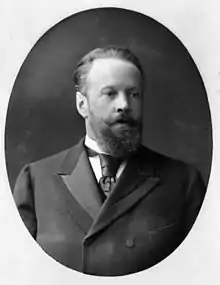 |
Count Sergei Yulyevich Witte (1849–1915) |
16 August 1903[21] |
6 November 1905[21] | ||||
Prime Minister of the Russian Empire (1905–1917)
The modern government type in Russia came after the establishment of the Council of Ministers on 1 November 1905, created for the "management and union action principal chiefs of departments on subjects like law and senior public administration", and modelled on the relevant institutions within the constitutional states, when all the ministries and directorates have been declared part of the unified state management. The first Prime Minister was Count Sergei Witte, who was appointed on 6 November 1905.[22]
| Portrait | Name (birth–death) |
Term of office | Monarch | |||
|---|---|---|---|---|---|---|
| 1 | .jpg.webp) |
Count Sergei Yulyevich Witte (1849–1915) |
• | 6 November 1905 | 5 May 1906 | Nicholas II.jpg.webp) (1894–1917) |
| 2 | .jpg.webp) |
Ivan Logginovich Goremykin (1839–1917) |
1 | 5 May 1906 | 21 July 1906 | |
| 3 | 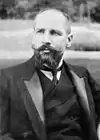 |
Pyotr Arkadyevich Stolypin (1862–1911) |
• | 21 July 1906 | 18 September 1911 (Assassinated) | |
| 4 | 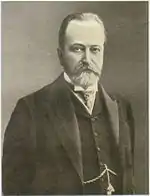 |
Count Vladimir Nikolayevich Kokovtsov (1853–1943) |
• | 22 September 1911 | 12 February 1914 | |
| (2) | .jpg.webp) |
Ivan Logginovich Goremykin (1839–1917) |
2 | 12 February 1914 | 2 February 1916 | |
| 5 | .jpg.webp) |
Baron Boris Vladimirovich Shtyurmer (1848–1917) |
• | 2 February 1916 | 23 November 1916 | |
| 6 | 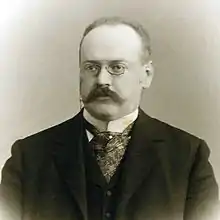 |
Alexander Fyodorovich Trepov (1862–1928) |
• | 23 November 1916 | 20 January 1917 | |
| 7 | 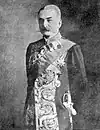 |
Prince Nikolai Dmitriyevich Golitsyn (1850–1925) |
• | 20 January 1917 | 12 March 1917 | |
Provisional Government/Russian Republic (1917)
After the alleged abdication of Nicholas II from the throne in favor of his brother Michael, Michael also abdicated, before the convening of the Constituent Assembly. On 14 September 1917, the Russian Republic was proclaimed. At this period, a provisional government was formed and the Prime Minister was the head of state.
| Portrait | Name (birth–death) |
Term of office | Political party | |||
|---|---|---|---|---|---|---|
| 8 | 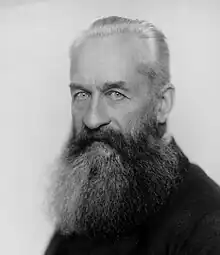 |
Prince Georgy Yevgenyevich Lvov (1861–1925) |
• | 15 March 1917 | 21 July 1917 | Constitutional Democratic Party |
| 9 | 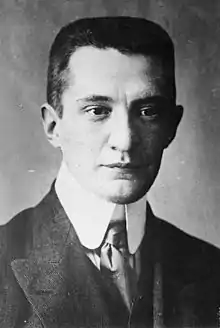 |
Alexander Fyodorovich Kerensky (1881–1970) |
1 | 21 July 1917 | 14 September 1917 | Socialist Revolutionary Party |
| 2 | 14 September 1917 | 7 November 1917 | ||||
Russian State (1918–1920)
The heads of government of the Russian State during the Civil War were de facto Prime Ministers in exile.
| Portrait | Name (birth–death) |
Term of office | Political party | Head of state | ||||
|---|---|---|---|---|---|---|---|---|
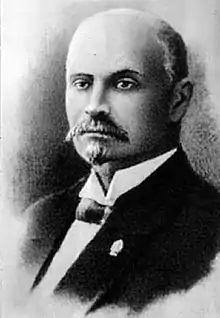 |
Pyotr Vasilyevich Vologodsky (1863–1925) |
I | 4 November 1918 | 18 November 1918 | Socialist Revolutionary Party | The Directory (1918) | ||
| II | 18 November 1918 | 22 November 1919 | Alexander Kolchak (1918–1920) | |||||
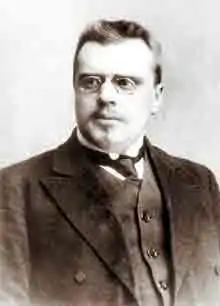 |
Viktor Nikolayevich Pepelyayev (1885-1920) |
22 November 1919 | 4 January 1920 | Independent | ||||
Russian Soviet Federative Socialist Republic (1917–1991)
Since the creation of the Russian Soviet Republic its cabinet was styled as the Council of People's Commissars. Between the creation of the USSR on 30 December 1922 and the formation of its own Council of People's Commissars on 6 July 1923, the Council of People's Commissars of Russia temporarily acted as the government of the USSR. On 23 March 1946, the Council of People's Commissars was renamed into the Council of Ministers of the RSFSR.
| Portrait | Name (birth–death) |
Term of office | Political party | Legislature (election) |
Head of state | ||||
|---|---|---|---|---|---|---|---|---|---|
| 10 | 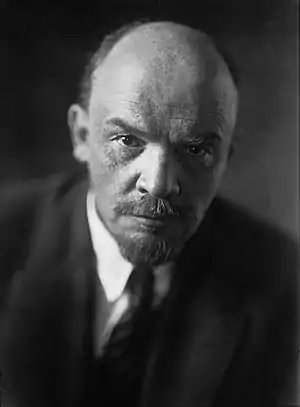 |
Vladimir Ilyich Ulyanov (Lenin) (1870–1924) |
• | 8 November 1917 | 21 January 1924 (Died in office) |
Communist Party | ARCEC | Lev Kamenev (1917) | |
Yakov Sverdlov (1917–1919) | |||||||||
Mikhail Kalinin.jpg.webp) (1919–1938) | |||||||||
| 11 | (c).jpg.webp) |
Alexey Ivanovich Rykov (1881–1938) |
• | 2 February 1924 | 18 May 1929 | Communist Party | |||
| 12 | 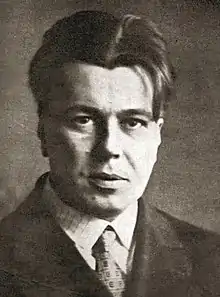 |
Sergey Ivanovich Syrtsov (1883–1937) |
• | 18 May 1929 | 3 November 1930 | Communist Party | |||
| 13 | 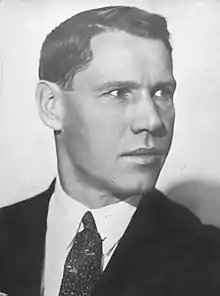 |
Daniil Yegorovich Sulimov (1890–1937) |
• | 3 November 1930 | 22 July 1937 | Communist Party | |||
| 14 | Nikolay Alexandrovich Bulganin (1895–1975) |
1 | 22 July 1937 | 19 July 1938[23] | Communist Party | ||||
| 2 | 20 July 1938[24] | 17 September 1938 | I (1938) |
Aleksei Badayev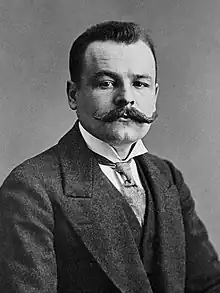 (1938–1944) | |||||
| 15 | .jpg.webp) |
Vasily Vasilyevich Vakhrushev (1902–1947) |
• | 17 September 1938 | 2 June 1940 | Communist Party | |||
| 16 | 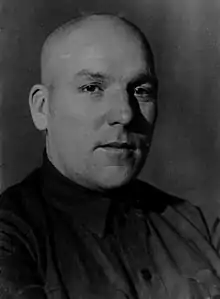 |
Ivan Sergeyevich Khokhlov (1895–1973) |
• | 2 June 1940 | 23 June 1943[note 3] | Communist Party | |||
| 17 | _-_53Fi3436_(cropped).jpg.webp) |
Alexey Nikolayevich Kosygin (1904–1980) |
• | 23 June 1943 | 23 March 1946 | Communist Party | |||
Nikolay Shvernik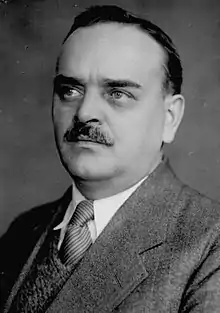 (1944–1946) | |||||||||
| 18 | .svg.png.webp) |
Mikhail Ivanovich Rodionov (1907–1950) |
1 | 23 March 1946 | 26 June 1947 | Communist Party | |||
| 2 | 26 June 1947 | 9 March 1949 | II (1947) |
Ivan Vlasov.svg.png.webp) (1946–1950) | |||||
| 19 | .svg.png.webp) |
Boris Nikolayevich Chernousov (1908–1978) |
1 | 9 March 1949 | 17 April 1951 | Communist Party | |||
| 2 | 17 April 1951 | 20 October 1952 | III (1951) |
Mikhail Tarasov.svg.png.webp) (1950–1959) | |||||
| 20 | .svg.png.webp) |
Alexander Mikhailovich Puzanov (1906–1998) |
1 | 20 October 1952 | 26 March 1955 | Communist Party | |||
| 2 | 26 March 1955 | 24 January 1956 | IV (1955) | ||||||
| 21 | .svg.png.webp) |
Mikhail Alexeyevich Yasnov (1906–1991) |
• | 24 January 1956 | 19 December 1957 | Communist Party | |||
| 22 | .svg.png.webp) |
Frol Romanovich Kozlov (1908–1965) |
• | 19 December 1957 | 31 March 1958 | Communist Party | |||
| 23 | 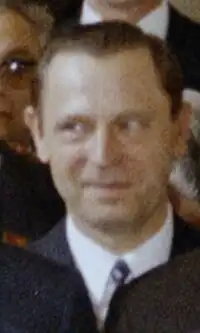 |
Dmitry Stepanovich Polyansky (1917–2001) |
1 | 31 March 1958 | 16 April 1959 | Communist Party | |||
Nikolay Ignatov.svg.png.webp) (1959) | |||||||||
| 2 | 16 April 1959 | 23 November 1962 | V (1959) |
Nikolay Organov.svg.png.webp) (1959–1962) | |||||
| 24 | 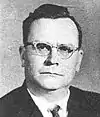 |
Gennady Ivanovich Voronov (1910–1994) |
1 | 23 November 1962 | 5 April 1963 | Communist Party | |||
Nikolay Ignatov.svg.png.webp) (1962–1966) | |||||||||
| 2 | 5 April 1963 | 12 April 1967 | VI (1963) | ||||||
Mikhail Yasnov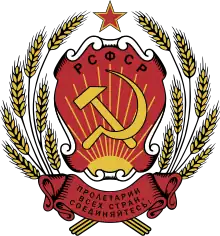 (1966–1985) | |||||||||
| 3 | 12 April 1967 | 23 July 1971 | VII (1967) | ||||||
| 25 | 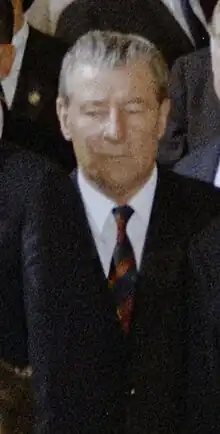 |
Mikhail Sergeyevich Solomentsev (1913–2008) |
1 | 28 July 1971 | 15 July 1975 | Communist Party | VIII (1971) | ||
| 2 | 15 July 1975 | 26 March 1980 | IX (1975) | ||||||
| 3 | 26 March 1980 | 24 June 1983 | X (1980) | ||||||
| 26 |  |
Vitaly Ivanovich Vorotnikov (1926–2012) |
1 | 24 June 1983 | 26 March 1985 | Communist Party | |||
| 2 | 26 March 1985 | 3 October 1988 | XI (1985) |
Vladimir Orlov (1985–1988) | |||||
| 27 |  |
Alexander Vladimirovich Vlasov (1932–2002) |
• | 3 October 1988 | 15 June 1990 | Communist Party | Vitaly Vorotnikov (1988–1990) | ||
Boris Yeltsin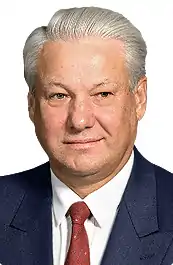 (1990–1991) | |||||||||
| 28 | .jpg.webp) |
Ivan Stepanovich Silayev (1930–2023) |
1 | 15 June 1990 | 10 July 1991[note 4] | Communist Party | XII (1990) | ||
| 2 | 12 July 1991 | 26 September 1991 | |||||||
| P |
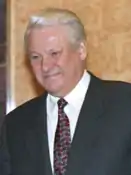 |
Boris Nikolayevich Yeltsin[note 5] (1931–2007) |
• | 6 November 1991 | 25 December 1991 | Independent | |||
Russian Federation (1991–present)
| Portrait | Name (birth–death) |
Term of office | Political party | President | ||||
|---|---|---|---|---|---|---|---|---|
| P | _(cropped).jpg.webp) |
Boris Nikolayevich Yeltsin (1931–2007) |
• | 25 December 1991 | 15 June 1992 | Independent | Boris Yeltsin_(cropped).jpg.webp) (1991–1999) | |
| 29 | 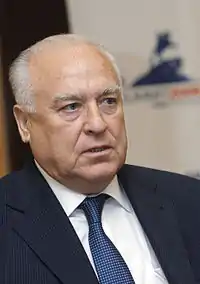 |
Viktor Stepanovich Chernomyrdin (1938–2010) |
1 | 14 December 1992 | 9 August 1996 | Our Home – Russia | ||
| 2 | 10 August 1996 | 23 March 1998 | ||||||
| 30 | .jpg.webp) |
Sergey Vladilenovich Kiriyenko (1962–) |
• | 24 April 1998 | 23 August 1998 | Independent | ||
| 31 | .jpg.webp) |
Yevgeny Maximovich Primakov (1929–2015) |
• | 11 September 1998 | 12 May 1999 | Independent | ||
| 32 | .jpg.webp) |
Sergey Vadimovich Stepashin (1952–) |
• | 19 May 1999 | 9 August 1999 | Independent | ||
| 33 | .jpeg.webp) |
Vladimir Vladimirovich Putin (1952–) |
1 | 16 August 1999 | 7 May 2000 | Independent | ||
| 34 | _(cropped).jpg.webp) |
Mikhail Mikhaylovich Kasyanov (1957–) |
• | 17 May 2000 | 24 February 2004 | Independent | Vladimir Putin_(cropped).jpg.webp) (2000–2008) [note 6] | |
| 35 | .jpeg.webp) |
Mikhail Yefimovich Fradkov (1950–) |
1 | 5 March 2004 | 7 May 2004 | Independent | ||
| 2 | 12 May 2004 | 12 September 2007 | ||||||
| 36 | 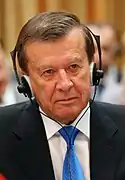 |
Viktor Alexeyevich Zubkov (1941–) |
• | 14 September 2007 | 7 May 2008 | United Russia | ||
| (33) | .jpeg.webp) |
Vladimir Vladimirovich Putin (1952–) |
2 | 8 May 2008 | 7 May 2012 | United Russia | Dmitry Medvedev.jpg.webp) (2008–2012) | |
| 37 | 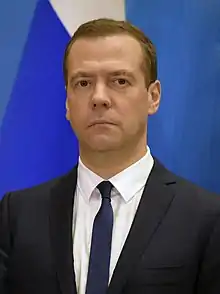 |
Dmitry Anatolyevich Medvedev (1965–) |
1 | 8 May 2012 | 7 May 2018 | United Russia | Vladimir Putin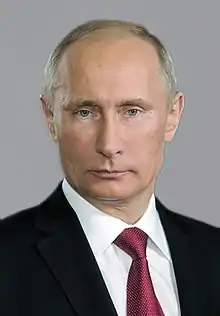 (2012–) | |
| 2 | 8 May 2018 | 15 January 2020 | ||||||
| 38 | .jpg.webp) |
Mikhail Vladimirovich Mishustin (1966–) |
• | 16 January 2020 | Incumbent | Independent | ||
Acting prime ministers
- Vladimir Kokovtsov: 18–22 September 1911
- Konstantin Pamfilov: 5 May 1942 – 2 May 1943
- Oleg Lobov: 26 September – 6 November 1991
- Yegor Gaidar: 15 June – 14 December 1992
- Sergey Kiriyenko: 23 March – 24 April 1998
- Viktor Chernomyrdin: 9–10 August 1996 and 23 August – 11 September 1998
- Sergey Stepashin: 12–19 May 1999
- Vladimir Putin: 9–16 August 1999
- Mikhail Kasyanov: 7–17 May 2000
- Viktor Khristenko: 24 February – 5 March 2004
- Mikhail Fradkov: 7–12 May 2004 and 12–14 September 2007
- Viktor Zubkov: 7–8 May 2008 and 7–8 May 2012
- Dmitry Medvedev: 7–8 May 2018 and 15–16 January 2020
- Andrey Belousov: 30 April – 19 May 2020.
Timeline
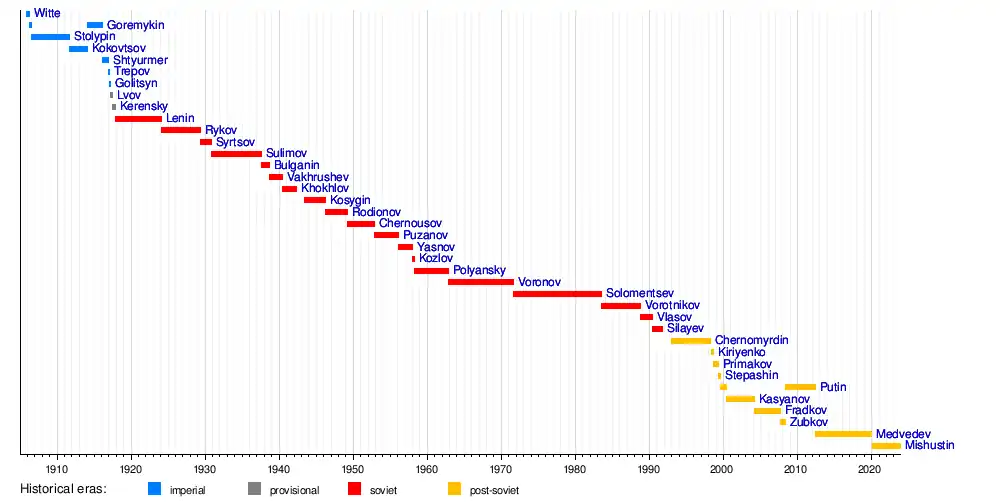
See also
Notes
- Sources which list Vyazmitinov as Saltykov's successor state a date of 9 September 1812; other sources assert that Saltykov was in office until his death
- Some sources (such as the Large Soviet Encyclopedia) list Vyazmitinov as committee minister, while other (such as the History of the Fatherland encyclopedia) don't mention him at all and instead list Lopukhin as the successor of Saltykov.
- Deputy premier Konstantin Pamfilov effectively exercised Khokhlov's duties since 5 May 1942 until his death on 2 May 1943.
- The Council of Ministers of the RSFSR resigned before the elected President of the RSFSR, who took office on July 10, 1991
- Headed the government as President of Russia, was not the Prime Minister.
- Putin de facto took this position on 31 December 1999, when he became Acting President after the resignation of Boris Yeltsin. Elected President on 26 March 2000, officially took office on 7 May 2000.
References
Citations
- "Комитет министров". Brockhaus and Efron Encyclopedic Dictionary: In 86 Volumes (82 Volumes and 4 Additional Volumes). St. Petersburg. 1890–1907.
{{cite book}}: CS1 maint: location missing publisher (link) - "Совет министров". Brockhaus and Efron Encyclopedic Dictionary: In 86 Volumes (82 Volumes and 4 Additional Volumes). St. Petersburg. 1890–1907.
{{cite book}}: CS1 maint: location missing publisher (link) - "Ministers' Council established in Russia". Presidential Library Named After Boris Yeltsin. Retrieved 10 August 2014.
- 7 царских председателей Совета министров
- "Верховный тайный совет". Brockhaus and Efron Encyclopedic Dictionary: In 86 Volumes (82 Volumes and 4 Additional Volumes). St. Petersburg. 1890–1907.
{{cite book}}: CS1 maint: location missing publisher (link) - Салтыков, князь Николай Иванович [Prince Nikolay Ivanovich Saltykov] (in Russian). Retrieved 7 April 2014.
- Неизвестная Фемида : документы, события, люди [The Unknown Themis: Documents, Events, People] (in Russian). ОЛМА Медиа Групп. 2003. p. 93. ISBN 978-5-224-04224-1.
- Кочубей, князь Виктор Павлович [Prince Viktor Pavlovich Kochubey] (in Russian). Retrieved 8 April 2014.
- B. V. Ananych, ed. (2008). Лики России Управленческая элита Российской империи: история министерств, 1802–1917 [Ruling Elite of the Russian Empire: History of Ministries, 1802–1917] (in Russian).
- Васильчиков Илларион Васильевич — Биографический указатель [Illarion Vasilyevich Vasilchikov – Biography] (in Russian). Archived from the original on 9 February 2014. Retrieved 5 April 2014.
- Vladimir Nikolayevich Balyazin; Voldemar Nikolayevich Balyazin (2008). Царский декамерон: От Николая I до Николая II. Исторические книги В.Н. Балязина (Historical Books by V. N. Balyazin) (in Russian). Vol. 2. ОЛМА Медиа Групп. p. 49. ISBN 978-5-373-01976-7.
- Александр Иванович Чернышев — Биографический указатель [Aleksandr Ivanovich Chernyshov] (in Russian). Retrieved 5 April 2014.
- Землевладельцы Панинского района. Князь Орлов Алексей Фёдорович [Landowners of the Panin Rayon. Prince Alexey Fyodorovich Orlov] (in Russian). Retrieved 9 April 2014.
- Орлов князь Алексей Федорович [Prince Aleksey Fyodorovich Orlov] (in Russian). Archived from the original on 7 April 2014. Retrieved 4 April 2014.
- Павел Павлович Гагарин [Pavel Pavlovich Gagarin] (in Russian). Russian Empire. Archived from the original on 7 April 2014. Retrieved 5 April 2014.
- Игнатьев Павел Николаевич [Pavel Nikolayevich Ignatyev] (in Russian). Russian Empire. Archived from the original on 7 April 2014. Retrieved 5 April 2014.
- Валуев Петр Александрович [Pyotr Aleksandrovich Valuyev] (in Russian). Russian Empire. Archived from the original on 7 April 2014. Retrieved 5 April 2014.
- Рейтерн Михаил Христофорович [Mikhail Khristoforovich Reytern] (in Russian). Russian Empire. Archived from the original on 7 April 2014. Retrieved 6 April 2014.
- Бунге Николай Христианович [Nikolay Khristianovich Bunge] (in Russian). Russian Empire. Archived from the original on 8 April 2014. Retrieved 7 April 2014.
- Дурново Иван Николаевич [Ivan Nikolayevich Durnovo] (in Russian). Russian Empire. Archived from the original on 8 April 2014. Retrieved 7 April 2014.
- "Витте Сергей Юлиевич (sic!)" [Sergey Yuliyevich (sic!) Witte] (in Russian). Russian Empire. Archived from the original on 8 April 2014. Retrieved 7 April 2014.
- Преобразован Совет министров Российской империи
- Заседания Верховного Совета РСФСР [1-го созыва], первая сессия (15-20 июля 1938 г.): стенографический отчет [Sessions of the Supreme Soviet of the RSFSR [1st convocation], first session (July 15–20, 1938): verbatim record] (in Russian). Moscow: Publishing House of the Supreme Soviet of the RSFSR. 1938. p. 79.
- Заседания Верховного Совета РСФСР [1-го созыва], первая сессия (15-20 июля 1938 г.): стенографический отчет [Sessions of the Supreme Soviet of the RSFSR [1st convocation], first session (July 15–20, 1938): verbatim record] (in Russian). Moscow: Publishing House of the Supreme Soviet of the RSFSR. 1938. p. 115.
Sources
- S. M. Seredonin, ed. (1902). Т. 1 : Комитет министров в царствование императора Александра Первого (1802 г. сентября 8 – 1825 г. ноября 19). – 1902. [Vol. 1: Committee of Ministers During the Reign of Emperor Aleksandr the First (8 September 1802 – 19 November 1825). – 1902] (in Russian). Vol. 1. Government Public Historical Library of Russia.
- B. Yu. Ivanov; B. M. Karev; E. I. Kuksina; A. S. Oreshnikov; O. V. Sukhareva, eds. (1999). История отечества [History of the Fatherland] (in Russian). Moscow: Большая Российская энциклопедия (Large Russian Encyclopedia). pp. 554–576.
- K. K. Arsenyev, ed. (1911–1916). Новый энциклопедический словарь [New Encyclopedic Dictionary] (in Russian). Vol. 1–29. Saint Petersburg: F. A. Brockhaus and I. A. Efron.
- A. A. Polovtsov, ed. (1896–1918). Русский биографический словарь (Russian Biographical Dictionary) (in Russian). Saint Petersburg: Russian Imperatorial Historical Society of Saint Petersburg